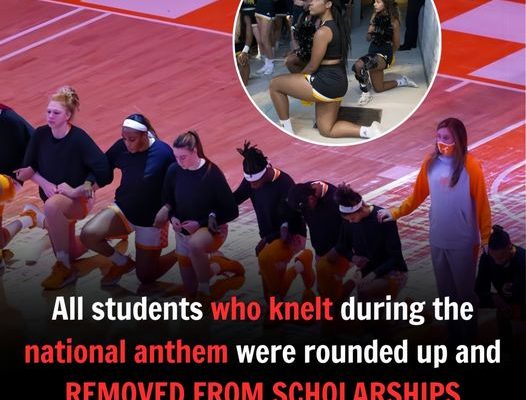The University of Texas (UT) has found itself at the center of controversy after reportedly revoking scholarships from five student-athletes who kneeled during the National Anthem in protest of racial injustice. Inspired by former NFL quarterback Colin Kaepernick, these athletes aimed to use their platform to highlight systemic racism and police brutality. The alleged decision by UT has ignited a national debate over the balance between free expression and institutional policies, raising critical questions about the rights of student-athletes to engage in peaceful protest.
Kneeling during the National Anthem as a form of protest was first popularized by Kaepernick in 2016. His silent gesture was intended to draw attention to racial disparities and police violence against Black Americans. While his stance received both praise and criticism, it undeniably sparked a larger movement, inspiring athletes at all levels to use their visibility to advocate for social justice. The UT athletes, in choosing to kneel, aligned themselves with this broader movement, making a bold statement about racial inequalities in America.
Reports of UT’s alleged revocation of scholarships have led to a deeply divided response. Supporters of the athletes argue that their right to free expression should be upheld, particularly when advocating for such a pressing social issue. They contend that penalizing these students for peaceful protest contradicts the university’s stated values of diversity, inclusion, and open discourse. Many view the reported actions as a suppression of student activism, which is historically a fundamental part of university culture.
On the other hand, critics argue that kneeling during the National Anthem is a sign of disrespect toward the American flag and those who have served in the military. They maintain that UT, as an institution, has the right to enforce rules regarding team conduct and that scholarships come with expectations of adherence to university policies. From this perspective, the athletes’ actions violated agreed-upon standards, and the alleged scholarship revocations were a justified consequence of breaking institutional guidelines.
This controversy highlights the broader challenges universities face in balancing institutional authority with students’ rights to protest. Universities have long been regarded as places where free thought and diverse perspectives are encouraged, making this situation particularly contentious. UT has historically supported academic and social discourse, and its reported actions against the athletes raise concerns about whether student activism is being stifled in favor of institutional conformity.
The debate also underscores a larger national discussion about the role of sports in social activism. Many high-profile athletes, from professional leagues to college teams, have used their platforms to speak out against racial injustice. The response to these protests has often reflected deep political and cultural divisions within the country. If the reports about UT’s decision prove accurate, it could set a precedent for how universities handle student-athlete activism moving forward.
As the controversy unfolds, UT faces mounting pressure to clarify its position. The university must navigate the difficult task of enforcing institutional policies while remaining committed to fostering an environment where students can express their beliefs. Whether this situation leads to policy changes or further disciplinary actions remains to be seen, but one thing is certain—the national conversation on race, protest, and free expression in college athletics is far from over.
